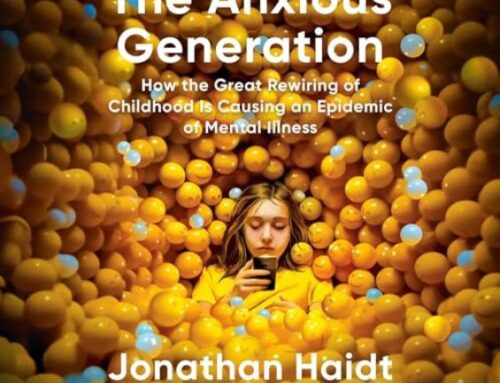 For most families, college is the acid test of their parenting, the point when independence is finally granted and the long years of helicopter parenting (hopefully) cease. In the aftermath of three generations that have embraced youthful rebellion as an inevitable stage of life – an idea almost unheard of a century ago – we send our children off to university (or its equivalent) resigned to seeing some, but hopefully not all, of our values questioned or even rejected.
For most families, college is the acid test of their parenting, the point when independence is finally granted and the long years of helicopter parenting (hopefully) cease. In the aftermath of three generations that have embraced youthful rebellion as an inevitable stage of life – an idea almost unheard of a century ago – we send our children off to university (or its equivalent) resigned to seeing some, but hopefully not all, of our values questioned or even rejected.
For Christian families, it’s even more anxious, given the general hostility to religion in general, and mainstream Christianity in particular, in academia, not to mention the moral gauntlet run by students in their undergraduate years. This is the story told in Blue Like Jazz, a new movie based on a bestselling collection of essays by Donald Miller, a writer raised Southern Baptist before he decided to leave Texas for Portland’s Reed College, reputedly one of the most liberal schools in the United States.
As directed by Steve Taylor, Miller’s story settles uneasily between a coming-of-age drama with religious themes and a latter-day Animal House shot through with strident political correctness and
the sharp-elbowed self-righteousness that arts and humanities students seem to be given with their souvenir t-shirt and pack of condoms during frosh week.
It doesn’t begin promisingly; Don (played by Marshall Allman) leaves Texas in the rush of a melodramatic crisis brought on by the hypocrisy of his Bible-thumping mother’s affair with
a married youth pastor. On both ends of his journey from Texas to Oregon, he encounters the worst elements of the conservative Christian and liberal secularist ideologies summed up in bumper stickers, and I groaned in anticipation of yet another battle of stereotypes and straw men.
He arrives at Reed looking for a challenge to his upbringing, and finds it when he falls in with a peer group that includes a lesbian, a charismatic militant atheist who dresses in Papal drag, and Penny (Claire Holt), the unfailing conscience of the school’s social justice scene. At this point, however, the film actually starts to improve, as Taylor depicts an only slightly hyperbolic onslaught of semi-educated young people and their cacophonous attitudes that most of us will recognize from our freshman and sophomore years; Allman’s Don complains that he feels “lost in a sea of individuality.”
Taylor has a lot of fun with the overbearingly nonconformist and aggressively flakey campus life at a college like Reed. In search of extracurricular activities, Don learns that flag football is canceled for lack of interest, but Lamaze For Non-Mothers is fully subscribed; it’s only a shade more absurd than the course in the Science of Superheroes actually offered by the University of California, Irvine, or Underwater Basket Weaving, an elective enrichment course offered by UC, San Diego.
All of this raging nonconformity has an oddly homogenous effect, and Don responds by downplaying his faith and upbringing and doing his best to re-invent himself as a secular smartass, counting coup with every barbed remark and classroom aside he makes at the expense of faith and the faithful. In Texas, Don could flatter himself that he was smarter than most of his fellow Baptists; at Reed, he gets tart solace from the knowledge that his new persona is pulling one over on his immensely self-satisfied cohort.
Thankfully the film doesn’t spend a lot of time trying to relieve Don of his virginity; after remarking a bit too ardently on it in the first half hour, the subject is dropped by the time the tone shifts from comic to dramatic, and so Blue Like Jazz has the distinction of being the rare film that doesn’t imagine that college sex is either a cure-all or an act of personal liberation.
The crisis comes when Don discovers that his dismissal of faith is more of a tantrum than a rational decision, and that it’s not shared by the person he admires (and desires) more than anyone else at Reed. This revelation almost redeems the whole of the film, and presents us with a dramatic climax where faith is essential to Don’s redemption, and not just a readymade plot point or a bit of lazy character shorthand.
Miller’s book have been cited as examples of the emergent church movement – a movement so decentralized at this point that no one knows whether to call it “emergent” or “emerging” – and it explains why the film’s breakthrough for Don onscreen is to make him “come out” as a Christian by apologizing on behalf of Christianity to everyone who comes to him for “confession” as part of his new duties as the new “Pope” of Reed College.
It’s a mark of the rare insight of the film that it hangs both ends of its story on the universal appeal of confession for both the faithful and the faithless. Unfortunately, the film’s ultimate failure is its inability to discern between confession and apology, inasmuch as the latter can be forced, insincere, expedient or formal, whereas the former can never be any of these things. And so the film fails, ultimately, by betraying an eagerness to please the faithless while selling the strengths and virtues of faith so short.




